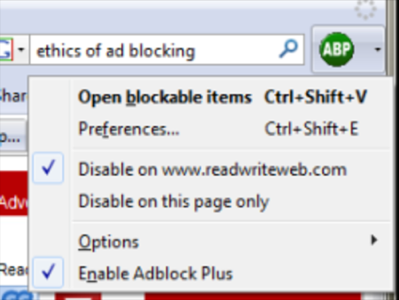Roughly 5% of Firefox users run a plugin called AdBlock Plus, which effectively blocks all display and text ads on websites. There can be little doubt that the ethics of using a tool like this can get pretty tricky, though a lot of users do opt to block online ads; and given that this is mostly an all-or-nothing approach, once a user decides to block ads on one site that features exceptionally annoying ads, they will also block ads on every other site as well. Now, AdBlock Plus’ developers have proposed a new meta tag that would allow site owners to pop up a notification for AdBlock Plus users, asking them if they want to block ads on a site that, according to the webmaster’s own judgment, does not contain any “annoying advertising.”

Even AdBlock Plus’ developers seem somewhat torn by the problems that their product can cause for webmasters; but, according to their reasoning, giving users an easier way to opt in to less annoying ads would encourage publishers to opt for less intrusive ads, which would ultimately give users less reason to use AdBlock Plus in the long run.
The proposed new meta tag would look something like this:
<meta name="advertising" content="ask" />According to the proposal, a pop-up window would appear at the top of the page when a user navigates to a site that implements this tag.

Ads Are Getting More Intrusive Again
It is no secret, of course, that most readers do not necessarily like ads – and while we have thankfully moved away from pop-up and pop-under ads on every single site (remember those?), the latest crop of new ads is getting increasingly invasive again. Just yesterday, the New York Times front page was taken over by a giant ad from chip maker Intel, which covered the text of the front page completely. And the new ad standards (including ads that remain in the page even when a user scrolls up or down) from the Online Publisher Association also call for bigger and more intrusive ads.
Of course, advertisers and publishers have to walk a fine line, where the ads still pay for the content without annoying readers so much that services like AdBlock Plus become a default tool for everybody.
Taking the AdBlock Plus proposal even further, maybe advertisers and site owners could set different ‘noise levels’ as well, so that users could automatically block ads that expand, make noise, or feature dancing aliens, but keep static display ads and text ads.

Do Publishers Have an Option?
While content providers have experimented with micropayments in the past, these experiments have generally failed, so at least for the time being, advertising is the most effective way for publishers (including ReadWriteWeb) to monetize their efforts. Content producers and advertisers are obviously aware of products like AdBlock Plus, and as the comments on the AdBlock Plus blog post clearly show, there is a large contingent of users who are adamantly against all forms of advertising on the web. These users will surely continue to block all ads on every site, but the AdBlock Plus proposal would make it easier for other users to control where they see ads.
What do You Think?
Here at ReadWriteWeb, our advertisers obviously don’t just keep our servers up and running, but they also keep all of us out of trouble, off the street, and gainfully employed, so we hope that you will decide to unblock ads on RWW and all the other sites that don’t feature intrusive ads; but feel free to let us know what you think about the state of online advertising and the AdBlock Plus proposal in the comments.

















